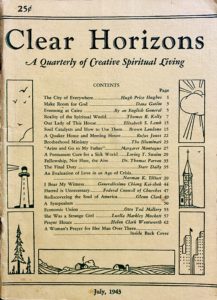 Your HOPE… should be great and dynamic, not little wishy-washy half-glimmers of optimism. Your LOVE… should be outgoing tidal waves that are clean and pure and not little personal attachments from which you withdraw when [there is] a false step. And your FAITH in your heavenly creator must be so complete that it will move mountains. – Glenn Clark
Your HOPE… should be great and dynamic, not little wishy-washy half-glimmers of optimism. Your LOVE… should be outgoing tidal waves that are clean and pure and not little personal attachments from which you withdraw when [there is] a false step. And your FAITH in your heavenly creator must be so complete that it will move mountains. – Glenn Clark
Prayer has always been central to CFO and the CFO Daily Program… but as our founder’s words explain, it’s not just any kind of prayer… It’s the kind of prayer that wakes us up into AWARENESS, presents (and asks us to make) CHOICES, and then calls us to ACTION. Finally, the CHANGE that we witness when we really pray is nothing short of transformative. It’s the kind of prayer that demands a ‘LETTING GO’ and a ‘GIVING ALL’. It’s not easy. It can be downright scary. Is it any wonder Glenn Clark called CFO a ‘training ground for athlete’s of the Spirit’?
The following story entitled The City of Everywhere, by Hugh Price Hughes, was published in Clear Horizons in the July 1943 issue. Like many stories, the narrative takes a round about route to ask a very simple and serious question: “Why don’t we really step out on the promises of God?” … Well, why don’t we?
THE CITY OF EVERYWHERE
I arrived there early one morning. It was cold, there were flurries of snow on the ground and as I stepped from the train on the platform I noticed that the baggageman and the red caps were warmly dressed in heavy coats and gloves, but, oddly enough, they wore no shoes. My first impulse was to ask the reason for this odd practice, but, repressing it I passed into the station and inquired the way to the hotel. My curiosity, however, was immediately enhanced by the discovery that no one in the station wore any shoes. Boarding the streetcar, I saw that my fellow travelers were likewise barefoot, and upon arriving at the hotel, I found the bellhop, the clerk and all the people had on no shoes.
Unable to restrain myself any longer, I asked the ingratiating manager what the practice meant. “What practice?” said he. “Why,” said I, pointing to his bare feet, “why don’t you wear shoes in this town?”
“Ah,” said he, “that is just it. Why don’t we?”
“But what is the matter? Don’t you believe in shoes?”
“Believe in shoes, my friend? I should say we do. That is the first article of our creed, shoes. They are indispensable to the well-being of humanity. Such cuts, sores and suffering as shoes prevent. It is wonderful.”
“Well, then, why don’t you wear them?” I asked, bewildered.
“Ah!” said he, “that is just it. Why don’t we?”
Though considerably nonplussed, I checked in, secured my room and went directly to the coffee shop and deliberately sat down by a friendly looking man who likewise conformed to the convention of wearing no shoes. The first thing we noticed upon walking out of the hotel was a huge brick building. To this he pointed with pride.
“You see that?” said he. “That is one of our outstanding shoe manufacturing establishments.”
“A what?” I asked in amazement. “You mean you make shoes there?”
“Well, not exactly,” said he, a bit ashamed, “we talk about making shoes there, and believe me, we have got one of the best and most brilliant speakers you have ever heard. He talks most thrillingly and convincingly every week on this great subject of shoes. He has a most persuasive and appealing way. Just yesterday he moved the people profoundly with his sermon on the necessity of shoe-wearing. It was really wonderful.”
“But why don’t they wear them?” said I, insistently.
“Ah!” said he, putting his hand upon my arm and looking wistfully into my eyes, “that is just it. Why don’t we?”
Just then, as we turned down a side street, I saw through a cellar window, a cobbler actually making a pair of shoes. Excusing myself from my friend, I burst into the little shop and asked the shoemaker how it happened that his shop was not overrun with customers. Said he, “Nobody wants my shoes. They just talk about them.”
“Give me what pairs you have ready,” said I, eagerly, and paid him thrice the amount he modestly asked. Hurriedly, I returned to my friend and said to him, “Here, my friend, one of these pairs will surely fit you. Take them; put them on. They will save you untold suffering.”
But he looked embarrassed, in fact he was well-nigh overcome with chagrin. “Thank you,” he said politely, “but you don’t understand. It just isn’t being done. The front families, well, I– I–“
“But why don’t you wear them? said I, dumbfounded.
“Ah!” said he, smiling with his accustomed ingratiating touch of practical wisdom,, “that is just it. Why don’t we?”
And coming out of the “City of Everywhere” into the “Here,” over and over and over that question rang in my ears: “Why don’t we? Why don’t we? Why don’t we?”
“All desire peace, but few desire the things that make for peace” – Thomas a Kempis
